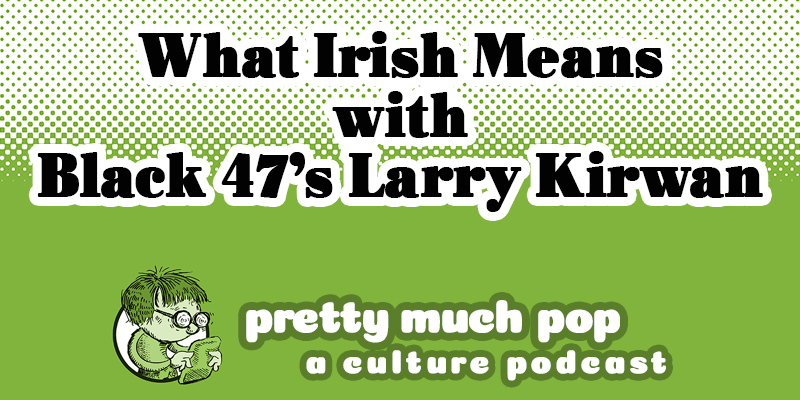What “Irish” Means: A Discussion with Author and Black 47 Front Man Larry Kirwan (Pretty Much Pop: A Culture Podcast #86)

Another St. Patrick’s Day has passed, and this one probably without a lot of green-beer-at-the-pub-action. Let’s talk about what sort of representation of Ireland we were supposed to get out of all that merriment, as it’s certainly not akin to the stern, very religious ceremonies that we the growing-up experience of our guest Larry Kirwan, who’s written books, plays and many songs emanating from and often about his Irish heritage.
He joins your Pretty Much Pop hosts Mark Linsenmayer, Erica Spyres, and Brian Hirt to discuss the appeal in the U.S. of Irish culture and how it relates to history, who gets to define what’s authentically Irish, slurs and stereotypes, the range of Irish music, the character of Irish humor, Larry’s journey as front man for Black 47, and his new novel about Irish cops on 9/11: Rockaway Blue (enter 09FLYER at checkout on the Cornell Press site for a discount).
Watch one of Black 47’s old videos. Wikipedia lies about Tim. What is Ireland’s REAL national color?
Hear more of this podcast at prettymuchpop.com. This episode includes bonus discussion that you can access by supporting the podcast at patreon.com/prettymuchpop. This podcast is part of the Partially Examined Life podcast network.
Pretty Much Pop: A Culture Podcast is the first podcast curated by Open Culture. Browse all Pretty Much Pop posts.
What “Irish” Means: A Discussion with Author and Black 47 Front Man Larry Kirwan (Pretty Much Pop: A Culture Podcast #86) is a post from: Open Culture. Follow us on Facebook, Twitter, and Google Plus, or get our Daily Email. And don't miss our big collections of Free Online Courses, Free Online Movies, Free eBooks, Free Audio Books, Free Foreign Language Lessons, and MOOCs.
from Open Culture https://ift.tt/2NL82Qb
via Ilumina
Comments
Post a Comment